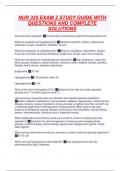NUR 325 EXAM 2 STUDY GUIDE WITH
QUESTIONS AND COMPLETE
SOLUTIONS
Define glucose regulation ✅The process of maintaining optimal blood glucose levels
What are symptoms of hypoglycemia? ✅Reduced cognition, tremors, diaphoresis,
weakness, hunger, headache, irritability, seizure
What are symptoms of hyperglycemia? ✅Polyuria, polydipsia, dehydration, fatigue,
fruity odor to breath, kussmaul breathing, weight loss, hunger, poor wound healing
What are risk factors for impaired glucose regulation? ✅Age, pregnancy, racial and
ethnic groups (hispanics, asian american, american indian, alaskan natives), genetics,
lifestyle, family history, selected medications
Euglycemia ✅70-140
Hypoglycemia ✅<70 severe if under 50
Hyperglycemia ✅>140
What is the role of hemoglobin A1C? ✅Measures how well your body regulates
glucose over 1-3 months (goal is under 7)
How would you recognize when an individual has impaired glucose regulation?
✅History (diabetic medications, central obesity, diabetes, hypertension, cardiovascular
disease, cancer), review of symptoms (have you been urinating more than normal? any
unintended weight loss?) anthropometric measurements (BMI, waist-to-hip ratio),
evidence of peripheral vascular disease (numbness in the extremities, wound healing,
edema, atherosclerosis, checking vision), diagnostic testing
What collaborative interventions would you provide to a client to optimize glucose
regulation? ✅Education for self-management, monitoring and managing blood
glucose, nutrition therapy, pharmacologic agents (oral hypoglycemic agents, insulin,
statin agents)
What nursing interventions would you provide to a client to optimize glucose regulation?
✅15/15 rule
When are oral hypoglycemics administered? ✅Oral hypoglycemics are only
administered for type 2 diabetes
, When is insulin administered? ✅When blood glucose levels are too high
Why are sulfonylureas not used for type 1 diabetes? ✅Ineffective where there is an
absolute deficiency of insulin production (like type 1 diabetes)
Why should patients with kidney failure, alcoholism, heart failure, or COPD not take
meformin? ✅Lactic acidosis
When should regular insulin be administered? Why? ✅Regular insulin should be
administered 30-60 min before meals. This is because regular insulin is short acting
What is the onset of lispro insulin (Humalog)? ✅15-30 minutes
What is the peak of lispro insulin (Humalog)? ✅30 minutes to 2.5 hours
What is the duration of lispro insulin (Humalog)? ✅3-6 hours
What is the onset of regular insulin (Humulin R)? ✅30 min-1 hour
What is the peak of regular insulin (Humulin R)? ✅1-5 hours
What is the duration of regular insulin (Humulin R)? ✅6-10 hours
What is the onset of NPH insulin (Humulin N)? ✅1-2 hours
What is the peak of NPH insulin (Humulin N)? ✅6-14 hours
What is the duration of NPH insulin (Humulin N)? ✅16-24 hours
What is the onset of insulin glargine (Lantus)? ✅70 minutes
What is the peak of insulin glargine (Lantus)? ✅None
What is the duration of insulin glargine (Lantus)? ✅18-24 hours
What insulin is rapid acting? ✅Lispro insulin (Humalog)
What insulin is short acting? ✅Regular insulin (Humulin R)
What insulin is intermediate acting? ✅NPH insulin (Humulin N)
What insulin is long acting? ✅Insulin glargine (Lantus)




